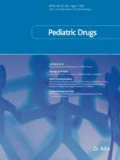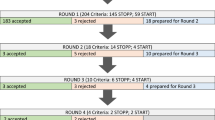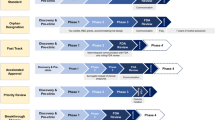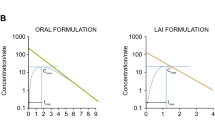Abstract
Equipoise is a fundamental ethical principle in the conduct of interventional trials comparing two or more treatment arms. This principle dictates that, at the time of planning and executing such trials, the researchers must have no compelling evidence that one arm is superior to the other arm(s). That means that it is unethical to involve patients in a study where one intervention is convincingly better than the other, as this would mean that a group of patients will receive an inferior option, which may endanger their health. While this principle may be straightforward at the beginning of a trial, there are numerous ways how it may be subsequently disrupted. Presently, most of the literature on equipoise deals with adult patients, with very little experience in children. This paper illustrates the principle of equipoise and the process of defining it. Because the majority of pediatric medications have not been studied adequately and are not labeled for pediatric use, it is often challenging to decide whether equipoise exists for a certain pharmacological treatment. Moreover, the equipoise may dynamically change during the conduct of a study, if new evidence from other studies becomes available.
Similar content being viewed by others
References
Freedman B. Equipoise and the ethics of clinical research. N Engl J Med. 1987;317:141–5.
International conference on harmonisation of technical requirements for registration of pharmaceuticals for human use. http://www.ich.org/fileadmin/Public_Web_Site/ICH_Products/Guidelines/Efficacy/E6_R1/Step4/E6_R1__Guideline.pdf
Tri-Council Policy Statement—ethical conduct for research involving humans. http://www.pre.ethics.gc.ca/pdf/eng/tcps2/TCPS_2_FINAL_Web.pdf
Angell M, Kliger CH, Germain A, Martin WG. AIDS studies violate Helsinki rights accord. N Y Times Web. 1997;A26.
Shapiro HT, Meslin EM. Ethical issues in the design and conduct of clinical trials in developing countries. N Engl J Med. 2001;345:139–42.
van der Graaf R, van Delden JJ. What is the best standard for the standard of care in clinical research? Am J Bioeth. 2009;9:35–43.
London AJ. The moral foundations of equipoise and its role in international research. Am J Bioeth. 2006;6:48–51; discussion W42.
Donovan JL, de Salis I, Toerien M, Paramasivan S, Hamdy FC, Blazeby JM. The intellectual challenges and emotional consequences of equipoise contributed to the fragility of recruitment in six randomized controlled trials. J Clin Epidemiol. 2014;67(8):912–20.
Hirshberg EL, Sward KA, Faustino EV, et al. Clinical equipoise regarding glycemic control: a survey of pediatric intensivist perceptions. Pediatr Crit Care Med. 2013;14:123–9.
Harrison D, Bueno M, Yamada J, Adams-Webber T, Stevens B. Analgesic effects of sweet-tasting solutions for infants: current state of equipoise. Pediatrics. 2010;126:894–902.
Vohra S, Reilly M. Equipoise with respect to wrapping premature newborns immediately after delivery. Paediatr Child Health. 2006;11:270.
Cramer K, Wiebe N, Hartling L, Crumley E, Vohra S. Heat loss prevention: a systematic review of occlusive skin wrap for premature neonates. J Perinatol. 2005;25:763–9.
Laughon MM, Avant D, Tripathi N, Hornik CP, Cohen-Wolkowiez M, Clark RH, Smith PB, Rodriguez W. Drug labeling and exposure in neonates. JAMA Pediatr. 2014;168(2):130–6.
Wimmer S, Rascher W, McCarthy S, Neubert A. The EU paediatric regulation: still a large discrepancy between therapeutic needs and approved paediatric investigation plans. Paediatr Drugs. 2014;16(5):397–406.
Sharfstein JM, North M, Serwint JR. Over the counter but no longer under the radar—pediatric cough and cold medications. N Engl J Med. 2007;357:2321–4.
Waddell L. Management of infantile colic: an update. J Fam Health Care. 2013;23(3):17–22.
Mittal R. Recent advances in febrile seizures. Indian J Pediatr. 2014;81(9):909–16.
Lau J, Antman EM, Jimenez-Silva J, Kupelnick B, Mosteller F, Chalmers TC. Cumulative meta-analysis of therapeutic trials for myocardial infarction. N Engl J Med. 1992;327:248–54.
Mhaskar R, B Bercu B, Djulbegovic B. At what level of collective equipoise does a randomized clinical trial become ethical for the members of institutional review board/ethical committees? Acta Inform Med. 2013;21:156–159.
Salles AM, Galvao TF, Silva MT, Motta LC, Pereira MG. Antioxidants for preventing preeclampsia: a systematic review. Sci World J. 2012;2012:243476.
Fortmann SP, Burda BU, Senger CA, Lin JS, Whitlock EP. Vitamin and mineral supplements in the primary prevention of cardiovascular disease and cancer: an updated systematic evidence review for the U.S. Preventive Services Task Force. Ann Intern Med. 2013;159:824–34.
Togo K, Iwasaki M. Optimal timing for interim analyses in clinical trials. J Biopharm Stat. 2013;23(5):1067–80.
Fischl MA, Richman DD, Grieco MH, et al. The efficacy of azidothymidine (AZT) in the treatment of patients with AIDS and AIDS-related complex. A double-blind, placebo-controlled trial. N Engl J Med. 1987;317:185–91.
Acknowledgments
K. Chau and G. Koren declare no conflict of interest related to this paper. No source of funding was used in writing this paper.
Author information
Authors and Affiliations
Corresponding author
Additional information
This article is part of the topical collection on Ethics of Pediatric Drug Research.
Rights and permissions
About this article
Cite this article
Chau, K., Koren, G. The Principle of Equipoise in Pediatric Drug Trials. Pediatr Drugs 17, 17–21 (2015). https://doi.org/10.1007/s40272-014-0105-1
Published:
Issue Date:
DOI: https://doi.org/10.1007/s40272-014-0105-1




